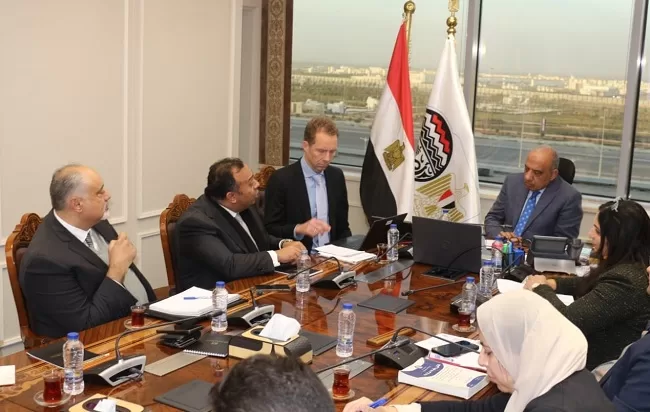CAIRO – Egypt’s Minister of Public Business Sector Mahmoud Essmat held a meeting with a delegation from the World Bank led by Peter Farob Ladijard, the chief consultant in the Public Sector of the World Bank Group.
The talks covered various areas of cooperation, including environmental compatibility, workforce training, partnership projects with the private sector, restructuring, and governance principles, especially the regulations and laws that have facilitated the implementation of administrative governance rules and other measures that have affected the results of business operations in the recent period.
The meeting, which took place at the ministry’s headquarters in the New Administrative Capital, was attended by Mohamed Hassona, the minister’s advisor for investment and restructuring, Rasha Omar, the minister’s assistant for project development and Saeed Arafa, the legal advisor to the Ministry.
The minister, according to MENA, welcomed the World Bank delegation, praising the fruitful cooperation between Egypt and the WB. He highlighted the ministry’s areas of work, the diverse sectors, and activities of its affiliated companies. He emphasized ongoing efforts for restructuring and performance improvement.
He affirmed that the ministry’s work strategy aligns with the State Ownership Policy document, which has been approved to encourage and attract the private sector. The strategy targets increasing its investments and strong presence in the Egyptian market, enhancing its contribution to the national economy, attracting more foreign investments, and providing a comprehensive overview of the state’s presence in various economic sectors and activities in the coming period, the minister explained.
The comprehensive plan for developing and improving the performance of affiliated companies in various technical, financial, and administrative aspects has been adopted and is being implemented, Essmat said.
The ministry is continuously monitoring progress and actively addressing challenges in the reform process, the minister noted.
Efforts are focused on increasing disclosure and transparency in companies, applying governance rules, and supporting boards of directors with diverse expertise to achieve desired goals and maximize asset returns, Essmat added.
The minister highlighted the significant focus on leveraging assets and efficiently managing them to increase achieved returns. He expressed openness to cooperation and partnership with the private sector, seeking its expertise in developing affiliated companies through various possible partnership methods.
He explained that training is a crucial part of the development plan, with a focus on training employees and providing modern training programs in collaboration with major universities and scientific institutions to develop skills and capabilities.
This includes transformative training, and there is a plan for digital transformation in affiliated companies through the implementation of Enterprise Resource Planning (ERP) systems, he said.
The World Bank delegation commended the reforms undertaken by the Ministry of Public Business Sector to enhance the role of the private sector and improve the performance of affiliated companies. They noted that Law 203 for the public business sector and its amendments provide a better environment for implementing governance and sound management standards.
The delegation also pointed out experiences of other countries in developing the system for managing state-owned companies. They praised the performance indicators in affiliated companies and emphasized the necessity of sharing experiences between the Ministry of Public Business Sector and affiliated companies in other sectors and ministries.






Discussion about this post